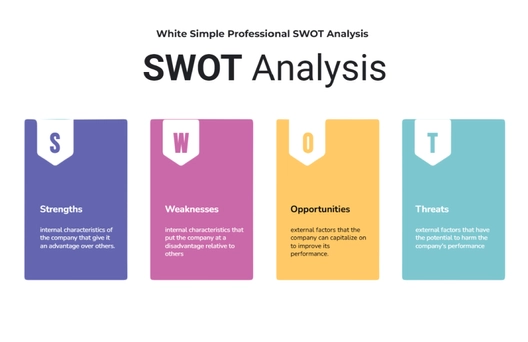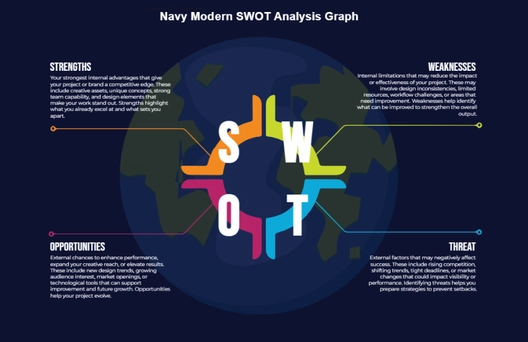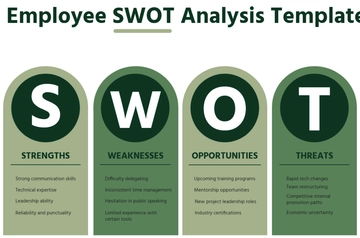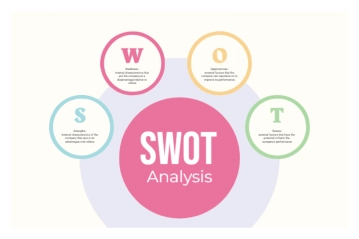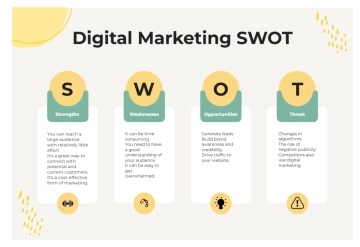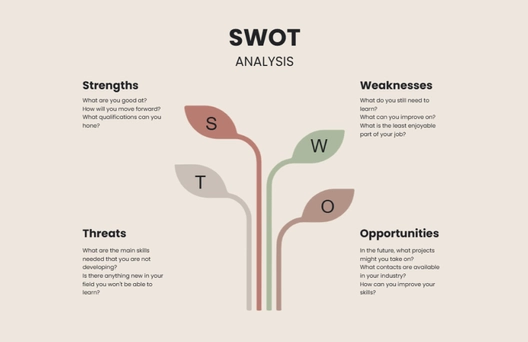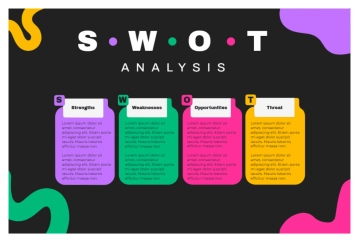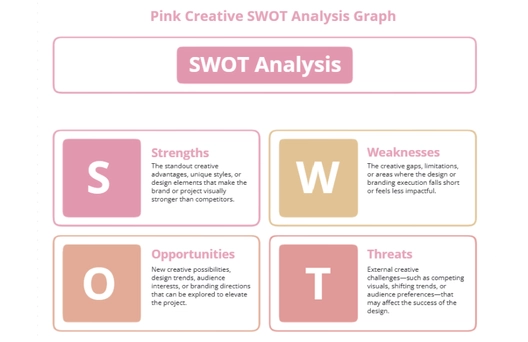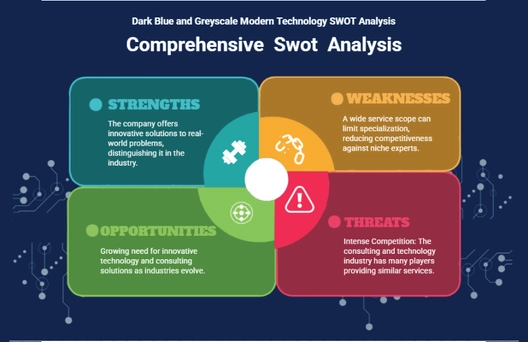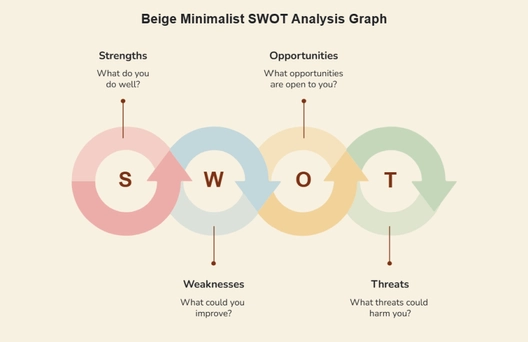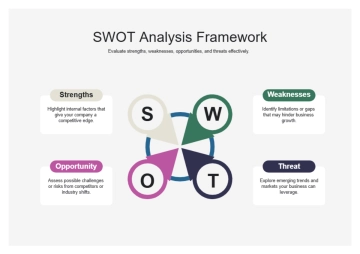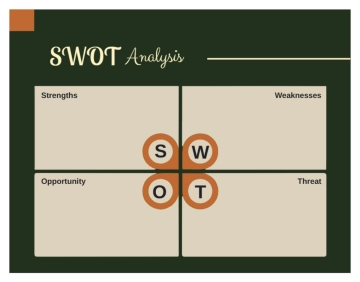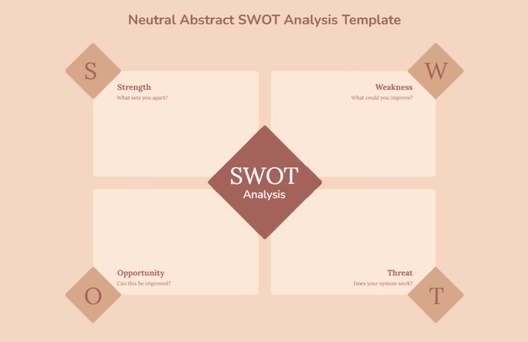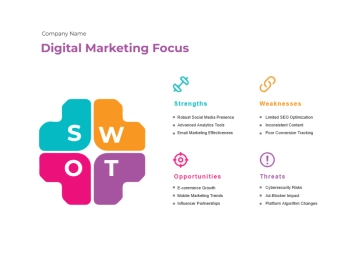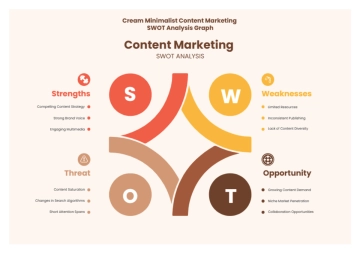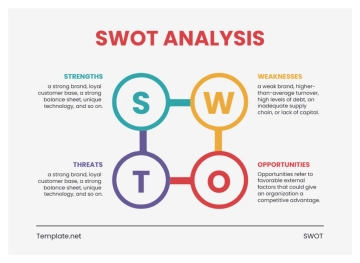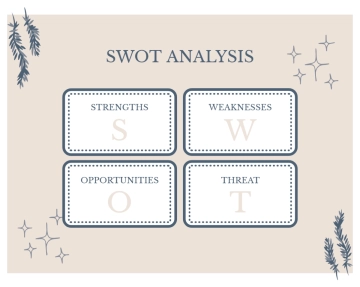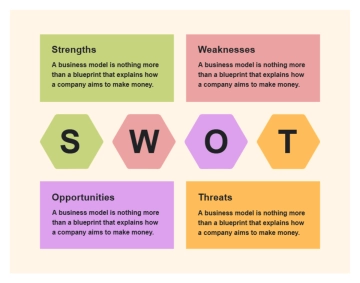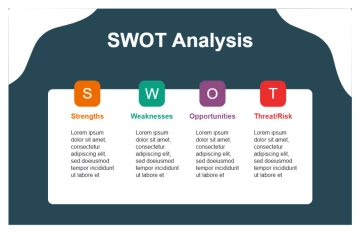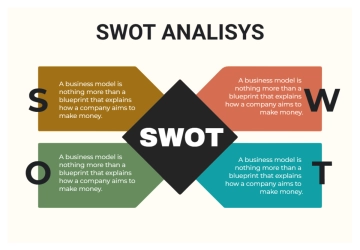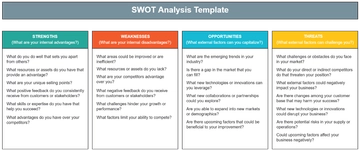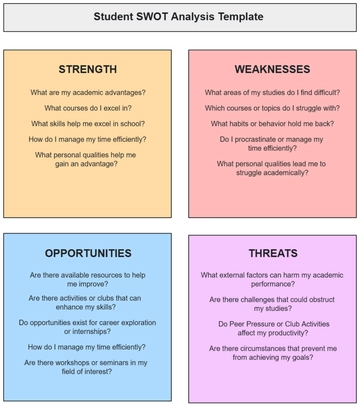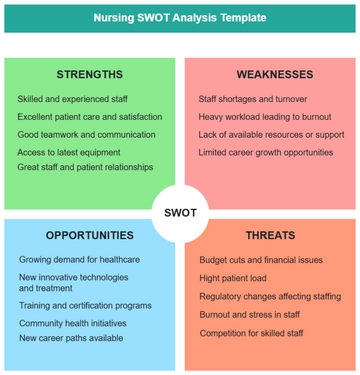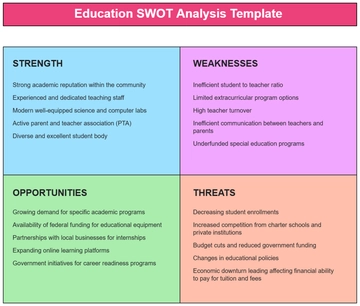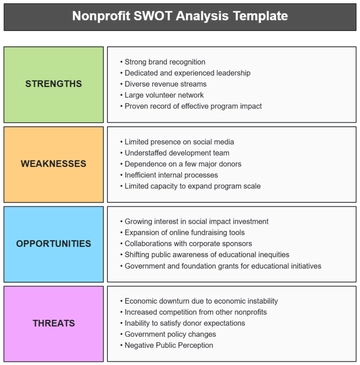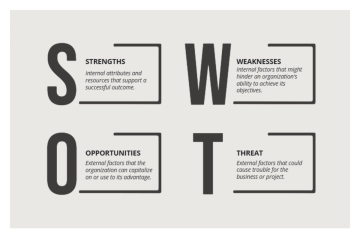Free Travel Agency SWOT Analysis
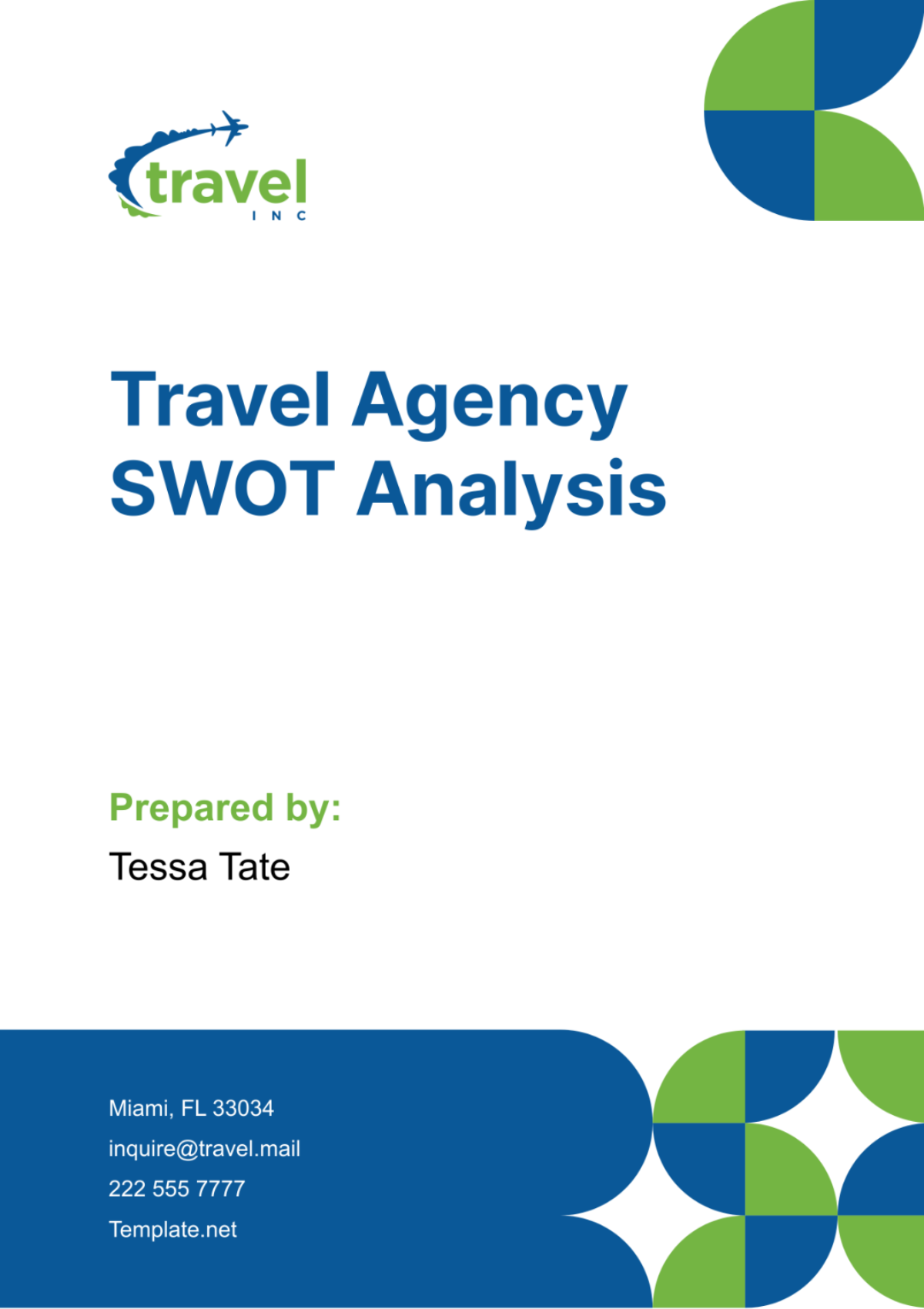
I. Introduction
In the dynamic and ever-evolving travel industry, it is imperative for us to regularly evaluate our strategic position and adapt to both market and global changes. This SWOT analysis serves to identify the internal strengths and weaknesses within our operations, as well as the external opportunities and threats that could impact our future growth and sustainability. The purpose of this document is to guide our strategic planning efforts by providing a clear and concise evaluation that supports informed decision-making and helps us to capitalize on current and future market trends. Understanding these elements is crucial for enhancing our competitiveness and ensuring our continued success in the travel sector.
II. SWOT Overview
Strengths | Weaknesses |
Established Customer Base Strong Brand Identity Strategic Partnerships Expertise and Knowledge Unique Offerings | Dependence on External Factors High Operational Costs Limited Marketing Budget Technology Integration Regulatory Compliance |
Opportunities | Threats |
Emerging Markets Technological Advancements Changing Consumer Preferences Strategic Alliances Sustainability Trends | Competition Economic Fluctuations Geopolitical Issues Technological Disruption Changes in Consumer Behavior |
III. Strengths
Our organization has cultivated a series of robust strengths that serve as the foundation for our continued success in the competitive travel market. These strengths not only differentiate us from our competitors but also contribute significantly to our resilience and growth.
A. Established Customer Base
We take pride in our high customer retention rate of 75%, with over 30,000 repeat clients. This loyal customer base is a testament to the trust and satisfaction that travelers have in our services. It provides us with a stable revenue stream and a strong platform for word-of-mouth marketing, which is invaluable in attracting new clients.
B. Strong Brand Identity
Our brand is recognized globally as a leading provider of luxury and adventure travel, with presence in over 20 countries. This strong brand identity enhances our market visibility and helps in fostering partnerships and collaborations, further solidifying our reputation as a top choice for quality travel experiences.
C. Strategic Partnerships
Our strategic partnerships with over 100 airlines and 200 hotel chains around the world allow us to offer competitive rates and exclusive packages to our clients. These relationships not only expand our service offerings but also enhance our flexibility and responsiveness to market changes, providing us with a significant competitive advantage.
D. Expertise and Knowledge
Our team consists of 50 certified travel experts who specialize in over 40 destinations worldwide. Their deep knowledge and firsthand experience ensure that our clients receive well-informed, carefully tailored advice that enhances their travel experience. This expertise is a critical asset that contributes to our high levels of customer satisfaction and repeat business.
E. Unique Offerings
We provide exclusive and unique travel experiences, such as Arctic expeditions and cultural immersions, which distinguish us in the marketplace. These offerings are specifically designed to cater to niche markets and sophisticated travelers seeking unique experiences, setting us apart from conventional travel options and attracting a diverse clientele.
IV. Weaknesses
While our strengths position us well within the industry, we also recognize several internal weaknesses that could potentially inhibit our growth and operational efficiency. Addressing these weaknesses is crucial for enhancing our competitiveness and ensuring sustainable development.
A. Dependence on External Factors
Our operations are significantly influenced by external events, which have previously led to a 20% decline in bookings during global crises. This vulnerability to factors beyond our control, such as geopolitical tensions and economic downturns, poses a constant risk to our financial stability and growth.
B. High Operational Costs
Maintaining our extensive network of physical offices and a large staff base incurs substantial operational costs, totaling approximately $5 million annually. These high costs reduce our financial flexibility and can limit our ability to invest in other strategic areas such as marketing and technology upgrades, which are crucial for staying competitive in a rapidly evolving market.
C. Limited Marketing Budget
Our marketing budget is constrained to $500,000 annually, which significantly limits our ability to reach new audiences and expand our market share. This restricted budget impacts our visibility and hampers our efforts to compete effectively with larger players in the industry who have the resources to engage in more aggressive marketing campaigns.
D. Technology Integration
Our current booking and operational systems are outdated, which leads to inefficiencies in customer service and operational management. The lack of modern, integrated technology systems not only affects our efficiency but also impacts the customer experience, potentially driving clients to more technologically adept competitors.
E. Regulatory Compliance
Compliance with international travel regulations and laws incurs costs of around $200,000 each year. This not only adds to our operational expenses but also complicates our ability to quickly adapt to new markets. The regulatory landscape can be a significant barrier, especially when attempting to expand into regions with stringent travel and business operation laws.
V. Opportunities
Despite the challenges presented by the market, there are numerous opportunities for us to expand and enhance our business. Capitalizing on these opportunities will enable us to grow our market share, improve our service offerings, and increase our competitiveness in the travel industry.
A. Emerging Markets
The travel markets in Asia and Africa are experiencing rapid growth, with travel spending projected to increase by 10% annually. These regions offer significant opportunities for expansion due to their large populations and increasing economic prosperity. By establishing a presence in these markets, we can tap into a new customer base and diversify our revenue streams, reducing our dependence on more saturated markets.
B. Technological Advancements
Investing in advanced technologies such as AI and mobile applications could enhance our operational efficiency by 30%. These technologies not only improve our booking systems and customer service capabilities but also enable us to offer personalized travel experiences, which are increasingly in demand. Staying at the forefront of technology will help us to remain competitive and appealing to tech-savvy consumers.
C. Changing Consumer Preferences
There is a notable shift towards personalized and experiential travel, with 60% of travelers seeking unique and tailored travel experiences. By focusing on bespoke travel packages and unique destination offerings, we can meet these evolving consumer demands and distinguish ourselves from competitors who offer more standardized travel solutions.
D. Strategic Alliances
Forming new strategic alliances with global event organizers and other businesses in the travel industry could increase our package sales by 20%. These partnerships allow us to offer more comprehensive packages and exclusive experiences, enhancing our value proposition and attracting customers looking for convenient, all-inclusive travel options.
E. Sustainability Trends
Sustainability in travel is becoming increasingly important, with 70% of our customer base expressing interest in sustainable travel options. This trend presents an opportunity for us to lead in the eco-friendly travel space by offering environmentally responsible travel packages and practices. By doing so, we can attract a growing segment of environmentally conscious travelers and differentiate ourselves in the market.
VI. Threats
The travel industry is susceptible to a range of external threats that can adversely affect our operations and market position. It is essential for us to remain vigilant and responsive to these threats to mitigate potential negative impacts and ensure our long-term viability.
A. Competition
The rise of online travel agencies and direct booking platforms has intensified competition in the industry. These competitors now hold approximately 50% of the market, attracting customers with user-friendly interfaces and lower pricing. This shift threatens to erode our market share and could force us to lower our prices or increase our service offerings, impacting our profitability.
B. Economic Fluctuations
Our revenue is highly sensitive to economic conditions, with potential revenue reductions of up to 25% during economic downturns. As discretionary spending on travel decreases during these periods, our business faces significant challenges in maintaining its revenue streams, necessitating the need for robust financial planning and diversification of income sources.
C. Geopolitical Issues
International tensions, wars, terrorism, and health crises can drastically reduce travel demand, with estimated impacts of up to 30% on our bookings. These issues can lead to travel bans, heightened security concerns, and a general reluctance among consumers to travel, all of which directly affect our operational capabilities and profitability.
D. Technological Disruption
Technological advancements, particularly in AI and direct booking technologies, pose a threat by potentially reducing our client base by 40%. These technologies enable consumers to plan and book their travel independently, bypassing traditional agencies like ours. Staying abreast of technological trends and integrating innovative solutions is crucial to counteracting these disruptions.
E. Changes in Consumer Behavior
There is a growing trend towards self-planned travel, facilitated by online resources and platforms, which could impact up to 35% of our traditional booking services. This shift in consumer behavior requires us to continually adapt and innovate our service offerings to meet the changing preferences and expectations of modern travelers.
VII. Recommendations
Based on our SWOT analysis, we propose several strategic actions to leverage our strengths, address our weaknesses, capitalize on opportunities, and mitigate threats. These recommendations are designed to enhance our competitive positioning and ensure sustainable growth in the dynamic travel industry.
Strengthen Technological Infrastructure: Upgrade our booking and operational systems to enhance efficiency and customer satisfaction. Implement AI-driven tools to offer personalized travel experiences and streamline internal processes.
Expand Market Presence in Emerging Markets: Establish local offices in key cities within Asia and Africa to tap into growing travel markets. Develop marketing campaigns tailored to these regions to build brand awareness and attract new customers.
Increase Marketing Investments: Allocate additional funds to our marketing budget to enhance digital marketing efforts, focusing on social media and online advertising to reach a broader audience.
Enhance Sustainable Travel Offerings: Develop and promote eco-friendly travel packages. Obtain sustainability certifications and partner with responsible local service providers to appeal to environmentally conscious travelers.
Diversify Product Offerings: Introduce new travel packages that cater to changing consumer preferences, such as wellness retreats, adventure sports, and cultural immersion experiences.
Build Strategic Alliances: Form partnerships with event organizers, local tourism boards, and other relevant entities to offer exclusive deals and comprehensive travel packages.
VIII. Conclusion
This SWOT analysis has provided valuable insights into our current position within the travel industry and outlined key areas for strategic improvement. By addressing our weaknesses and threats while building on our strengths and seizing the opportunities presented, we can enhance our resilience and adaptability in a competitive market. Implementing the recommended actions will help us to better meet the needs of our customers, improve operational efficiency, and drive sustainable growth. Ultimately, these efforts will ensure that we continue to provide exceptional value to our clients and maintain our position as a leader in the global travel industry.
- 100% Customizable, free editor
- Access 1 Million+ Templates, photo’s & graphics
- Download or share as a template
- Click and replace photos, graphics, text, backgrounds
- Resize, crop, AI write & more
- Access advanced editor
Optimize your travel agency's strategic planning with our Travel Agency SWOT Analysis Template from Template.net. This fully editable and customizable template is designed to help you identify strengths, weaknesses, opportunities, and threats with ease. Editable in our AI Editor tool, it's perfect for refining your business strategy efficiently. Tailor it today to fit your specific needs.
